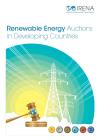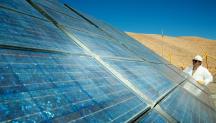

Renewable Energy Auctions in Developing Countries
Newsletter
Renewable energy auctions are an increasingly popular tool for governments to procure renewable electricity at moderate cost. IRENA’s report, Renewable Energy Auctions in Developing Countries, describes various types and aspects of renewable energy auction schemes, drawing on the actual experiences of five countries: Brazil, China, Morocco, Peru and South Africa.
In well-designed auction schemes, the competitive bidding allows unbiased “price discovery” by the authorities, resulting in greater cost efficiency for electricity from renewable sources, IRENA’s policy team found. Auctions can also include local content requirements to ensure the development of industries and creation of jobs in the renewable energy sector.
Not all auctions work the same way, and different methods offer varying degrees of complexity, speed and transparency. Streamlined administrative procedures, fairness to all bidders and transparency are essential to the success of an auction scheme, the report adds.
IRENA’s policy team continues to analyse other instruments, particularly feed-in tariff and feed-in premium schemes, in comparison to auctions for renewable energy. Analysis of auction schemes also continues as new market developments occur.




